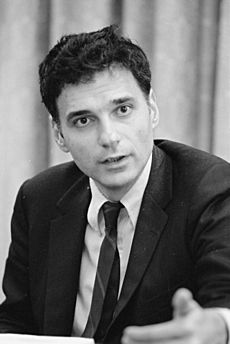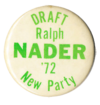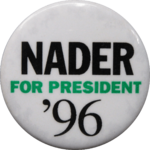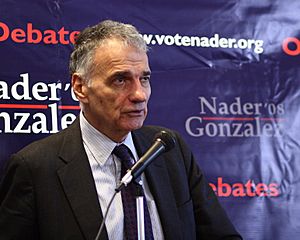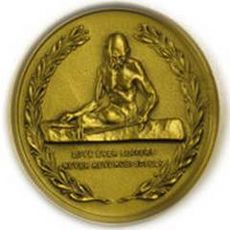Ralph Nader facts for kids
Quick facts for kids
Ralph Nader
|
|
|---|---|
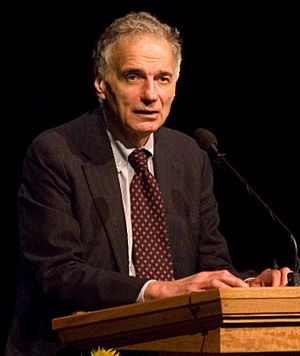
Nader in 2007
|
|
| Born | February 27, 1934 Winsted, Connecticut, U.S.
|
| Education | |
| Occupation |
|
| Political party |
|
| Parent(s) |
|
| Relatives |
|
| Awards |
|
| Military career | |
| Allegiance | |
| Service/ |
|
| Years of service | 1959 |
| Signature | |
 |
|
Ralph Nader, born on February 27, 1934, is an American lawyer and activist. He has worked hard to protect consumers and the environment. He also pushed for changes in how the government works.
Nader is well-known for running for president several times. His 1965 book, Unsafe at Any Speed, was very important. It criticized car companies for making unsafe cars. This book helped lead to a new law in 1966 called the National Traffic and Motor Vehicle Safety Act. This law made cars much safer for everyone.
Nader's parents came to the U.S. from Lebanon. He studied at Princeton University and Harvard Law School. He became very interested in how car designs could cause accidents and deaths. His book Unsafe at Any Speed pointed out problems with cars, especially the General Motors (GM) Corvair.
After his book came out, Nader formed a group of volunteer law students. They were called "Nader's Raiders." They investigated government agencies like the Federal Trade Commission. Their work helped improve these agencies. In the 1970s, Nader started many groups to protect people and watch over businesses. These included the Public Interest Research Group, the Center for Auto Safety, and Public Citizen. He often focused on car models like the Chevy Corvair and the Ford Pinto.
Nader ran for President of the United States four times. He ran with the Green Party in 1996 and 2000. He ran as an independent in 2004 and 2008. In each campaign, he wanted to bring attention to important issues. He also wanted to see changes in how elections are run. In 2000, he received almost three million votes. However, some people argued that his campaign helped Republican candidate George W. Bush win against Democratic candidate Al Gore.
Many magazines have named Nader as one of the "100 Most Influential Americans." These include Life, Time, and The Atlantic. A documentary film about his life, An Unreasonable Man, came out in 2006.
Contents
- Early Life and Education
- Ralph Nader's Career
- Personal Life
- Media Appearances
- Recognition and Awards
- Images for kids
- See also
Early Life and Education
Ralph Nader was born on February 27, 1934, in Winsted, Connecticut. His parents, Rose and Nathra Nader, were Christian immigrants from Lebanon. His father worked in a textile mill before opening a bakery and restaurant. Ralph sometimes helped at his father's restaurant. He also delivered newspapers.
Nader finished high school in 1951 and then went to Princeton University. He was offered a scholarship, but his father insisted he decline it. His father believed the money should go to a student who truly needed it. Nader graduated from Princeton in 1955 with high honors.
After Princeton, Nader went to Harvard Law School. He often skipped classes to travel across the U.S. He researched issues affecting Native Americans and migrant workers. He earned his law degree from Harvard in 1958. After law school, Nader served in the U.S. Army as a cook.
Ralph Nader's Career
Early Work and Activism
In 1959, Nader became a lawyer in Hartford, Connecticut. He also taught at the University of Hartford. He traveled to places like the Soviet Union, Chile, and Cuba. He wrote reports about his travels for newspapers. In 1964, he moved to Washington, D.C. There, he worked as a consultant for the Assistant Secretary of Labor.
Unsafe at Any Speed Book
Nader became nationally famous in 1965 with his book Unsafe at Any Speed. This book strongly criticized the car industry. It argued that many American cars were not safe to drive. Nader used information from over a hundred lawsuits against General Motors' Chevrolet Corvair to support his claims.
The book quickly became a bestseller. However, General Motors (GM) tried to discredit Nader. GM hired private investigators to follow him and try to find embarrassing information. Nader, who was working for a U.S. Senator, reported that he felt he was being followed. A government inquiry was held, and GM's CEO admitted under oath that the company had hired detectives. Nader sued GM for invading his privacy. He won $425,000 and used the money to start the Center for the Study of Responsive Law.
One year after Unsafe at Any Speed was published, Congress passed the National Traffic and Motor Vehicle Safety Act. This law made cars much safer. Many people said Ralph Nader's efforts were the main reason this important law passed.
"Nader's Raiders" and Public Interest Groups
In 1968, Nader gathered seven volunteer law students. The media called them "Nader's Raiders." They looked into how well the Federal Trade Commission (FTC) was working. Their report said the FTC was "ineffective." This led to a new investigation and helped President Richard Nixon improve the agency. The FTC then became much stronger in protecting consumers.
Nader's Raiders also worked on other important issues. These included nuclear safety, international trade, and food safety.
In 1971, Nader started the group Public Citizen. This group works to protect consumer rights and make sure the government is accountable. He was on its board until 1980.
Nader also founded the Center for Auto Safety. For 40 years, this group published "The Car Book." It gave ratings on car safety, maintenance costs, and fuel economy.
Environmental and Consumer Advocacy
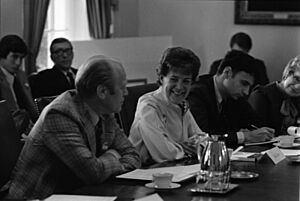
By the early 1970s, Ralph Nader was a well-known name. Many people saw him as a hero for ordinary citizens.
In the 1970s, Nader also became a leader in the movement against nuclear power. He started the Critical Mass Energy Project in 1974. This became the largest national group against nuclear power in the U.S. It helped local groups fight against nuclear energy.
Through the 1970s and 1980s, Nader continued his work with Public Citizen. He helped pass many important laws. These include the Freedom of Information Act, which lets people see government records. He also helped with the Clean Water Act and the Consumer Product Safety Act.
In the late 1990s, Nader accused Microsoft of being too powerful. He organized a meeting for people who criticized Microsoft.
Presidential Campaigns
1972 Presidential Bid
Ralph Nader was first mentioned as a possible presidential candidate in 1971. A new political group, the New Party, asked him to run in 1972. Author Gore Vidal strongly supported a Nader campaign. However, Nader decided not to run that year.
1996 Presidential Campaign
In 1996, Nader ran for President on the Green Party ticket. He was not officially chosen by the main Green Party group. Instead, various state Green parties nominated him. He appeared on the ballot in 22 states. He received over 685,000 votes, which was 0.71% of the total. This helped the Green Party grow. Nader chose not to spend much money on his campaign.
2000 Presidential Campaign
Nader decided to run for president again in 2000 as the Green Party candidate. He explained that he felt his public interest groups were not being heard in Washington.
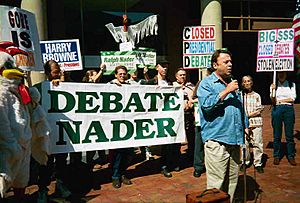
In June 2000, the Green Party officially nominated Ralph Nader and Winona LaDuke as their candidates.
In October 2000, Nader held a large rally in New York City. 15,000 people paid to hear him speak. Nader said that both major parties were controlled by big businesses. He called Al Gore and George W. Bush "Tweedledee and Tweedledum". Many famous people spoke or performed at the rally, including Susan Sarandon and Michael Moore.
Nader and LaDuke received nearly 2.9 million votes, which was 2.74% of the total. This was enough to get the Green Party on the ballot in many states for future elections.
Nader sometimes said he hoped Bush would win over Gore. He believed a Bush victory would make people more active in politics. He also thought environmental agencies might do better under Bush.
The "Spoiler" Debate
In the 2000 presidential election in Florida, George W. Bush won against Al Gore by only 537 votes. Nader received over 97,000 votes in Florida. This led to many claims that Nader's campaign caused Gore to lose the election. Nader disagrees with this idea.
Some studies have shown that Nader's candidacy was a key reason for Bush's victory. These studies found that Nader voters were likely to have voted for Gore if Nader had not been running.
However, a 2005 study by Harvard Professor B. C. Burden said Nader did play a big role. But it also said Nader was not trying to make Gore lose on purpose. He was trying to get 5% of the national vote for the Green Party.
2004 Presidential Campaign
On December 23, 2003, Nader announced he would not seek the Green Party's nomination in 2004. However, he did not rule out running as an independent.
Ralph Nader met with Democratic candidate John Kerry in 2004. Nader offered not to run if Kerry would focus on three important issues. Kerry did not agree to Nader's conditions. So, on February 22, 2004, Nader announced he would run as an independent.
Many Democrats asked Nader not to run because they worried he would take votes away from Kerry. The head of the Democratic Party said Nader had a great career, but he did not want Nader's legacy to be helping George Bush win again. Nader's campaign manager later said that the Democratic Party offered Nader money if he would not campaign in certain states. Nader confirmed this claim.
Nader received 463,655 votes in 2004, which was 0.38% of the total. He finished in third place.
2008 Presidential Campaign
In February 2008, Nader announced he would run for president again as an independent. He chose Matt Gonzalez as his running mate. Many notable people supported Nader, including Howard Zinn and Jesse Ventura. Nader's campaign raised $4.3 million, mostly from small donations. Nader and Gonzalez received 738,475 votes, finishing third in the 2008 United States presidential election.
| Campaign | Running mate | Ballot access | Funds raised | Popular vote | Party affiliation
Co-nominators |
Media and organizational endorsers | Notable endorsers | |
|---|---|---|---|---|---|---|---|---|
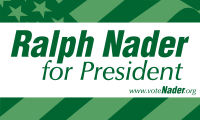 Ralph Nader presidential campaign, 2000 |
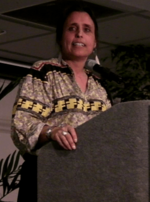 Winona LaDuke |
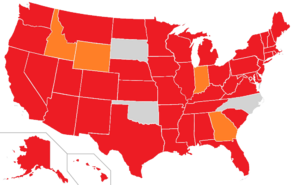 |
$8.4 million | 2,882,995 (2.74%) |
Green Party USA
Vermont Progressive Party |
* California Nurses Association * United Electrical Workers * Hemp Industries Association * Village Voice * The Austin Chronicle * Worcester Magazine * San Francisco Bay Guardian |
Susan Sarandon, Michael Moore, Howard Zinn, Eddie Vedder, Bill Murray, Pete Seeger, Linda Ronstadt, Paul Newman, Willie Nelson, Noam Chomsky, John B. Anderson, Phil Donahue | |
Ralph Nader presidential campaign, 2004 |
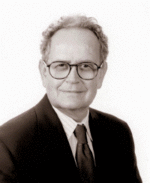 Peter Camejo |
$4.6 million | 463,655 (0.38%) |
unaffiliated
Reform Party USA Independence Party of New York Independent Party of Delaware |
David Brower, Patti Smith, Noam Chomsky, Howard Zinn, Phil Donahue | |||
 Ralph Nader presidential campaign, 2008 |
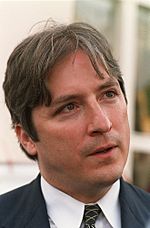 Matt Gonzalez |
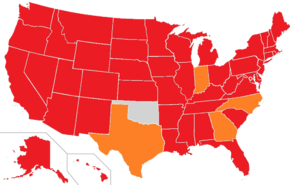 |
$4.3 million | 738,475
(0.56%) |
unaffiliated
Independent Party of Delaware |
Howard Zinn, Jesse Ventura, Justin Jeffre, Tom Morello, Val Kilmer, Rocky Anderson, James Abourezk, Patti Smith, Jello Biafra, Chris Hedges, Phil Donahue, Cindy Sheehan, Sean Penn | ||
Congressional Accountability Project
Nader started the Congressional Accountability Project. This group works to fight against corruption in the U.S. Congress.
Later Activities and Projects
Nader spoke out against the 2011 military action in Libya. He also criticized President Barack Obama for it.
In 2019, Nader's grandniece died in the Ethiopian Airlines crash. Nader then said that the Boeing 737 Max plane should never fly again. He believed it had a problem with its design, not just software. Nader also called for leaders at Boeing to resign. He said the Federal Aviation Administration had been too close to Boeing for years.
D.C. Library Renaissance Project
In 2002, Nader founded the D.C. Library Renaissance Project. This group tried to stop a new library from being built in Washington, D.C. They claimed the project had problems with affordable housing rules and land value. This group's legal challenges cost the D.C. government over a million dollars. Nader opposed private companies building D.C. libraries, even though the community supported it. He was concerned about a lack of fair bidding.
Only the Super-Rich Can Save Us! Book
In 2009, Nader published his first fiction book, Only the Super-Rich Can Save Us!. Many characters in the book were based on real people. The book received mixed reviews.
Nader also wrote a collection of fables called Animal Envy in 2016.
Ralph Nader Radio Hour
Since March 2014, Nader has hosted a weekly show called Ralph Nader Radio Hour. It features interviews with important people and discussions about current events.
American Museum of Tort Law
In 2015, Nader opened the American Museum of Tort Law in Winsted, Connecticut. He had planned it for ten years. Nader personally gave $150,000 to start the museum. He said he was surprised there wasn't a law museum in the country after over 200 years.
Newspapers
After a local newspaper closed in 2017, Nader helped start The Winsted Phoenix in 2018. He later stopped his support, and the paper closed in 2021. In 2022, Nader announced he was helping to fund a new newspaper in his hometown called the Winsted Citizen. He gave $15,000 for the first issue in February 2023. However, he later did not provide the promised funding for the second issue.
In April 2022, Nader also founded a print newspaper called Capitol Hill Citizen. This paper focuses on issues important to Nader, like corporate influence in government and corruption.
Personal Life
Nader's family was Antiochian Greek Orthodox Christian. He remembers his family being welcomed by a Methodist church when he was a child. Besides English, Nader also speaks Spanish, Russian, Portuguese, Chinese, and some Arabic.
Nader describes his beliefs as "moral empiricist" rather than left or right-wing. He has lived in Washington D.C. since the 1960s. However, he is officially a resident of Connecticut, where he votes.
His siblings are Laura (a professor of anthropology), Claire, and his late brother Shafeek. After his brother Shafeek died in 1986, Nader developed a condition that temporarily paralyzed one side of his mouth. He joked about it, saying his opponents couldn't say he was "talking out of both sides of my mouth." Nader's grandniece, Samya Stumo, was among the 157 people who died in the Ethiopian Airlines Flight 302 crash in March 2019.
Nader is a big fan of the New York Yankees baseball team.
Personality and Habits
People have described Nader as a very disciplined person. Even though he has money, he lives in a simple apartment. He spends only about $25,000 a year on personal expenses. He does most of his writing on a typewriter. He doesn't own a television and mostly uses public transportation. For many years, he wore shoes he bought at a clearance sale in 1959. His suits are often described as "wrinkled" or "styleless." One newspaper called him a "conscientious objector to fashion."
Nader has never married. He once told a writer who worked for him that he chose to dedicate his life to his career instead of having a family.
Finances
According to a report he filed in 2000, Nader owned over $3 million in stocks and mutual funds. His largest holding was over $1 million in Cisco Systems, Inc. He also owned shares in the Magellan Fund.
Nader said in 2000 that he did not own a car or real estate directly. He stated he lived on $25,000 a year. He gave most of his stock earnings to the many non-profit organizations he had started.
Nader owns shares in Amazon and believes the company should pay dividends to its shareholders. He also thinks there should be an investigation into Amazon's business practices.
Nader is also an Apple Inc. shareholder. In 2018, he wrote a letter to Apple's CEO, Tim Cook, criticizing the company's large stock buyback program.
Media Appearances
Film and Documentaries
In the 2005 movie Fun with Dick and Jane, Nader appeared as himself.
The documentary film An Unreasonable Man is about Ralph Nader's life and work. It was shown at the Sundance Film Festival in 2006.
Television Appearances
Nader has been a guest on many TV shows. These include Saturday Night Live, Real Time with Bill Maher, and The Daily Show.
In 1988, Nader appeared on Sesame Street as "a person in your neighborhood." He famously refused to sing a line that he thought was grammatically incorrect. So, they changed the line for him to sing: "a person whom you meet each day."
Recognition and Awards
- In 1967, Nader was named one of the "Ten Outstanding Young Men of the Year."
- In 1990, Life magazine listed Nader as one of the "100 Most Influential Americans of the 20th century."
- In 1999, Time magazine also named Nader one of the "100 Most Influential Americans of the 20th Century."
- In 1999, a group of journalists ranked Unsafe at Any Speed as 38th among the top 100 pieces of journalism of the 20th century.
- In 2006, The Atlantic named Nader one of the "100 Most Influential Americans."
- In 2008, Nader was listed among the "100 Most Influential Americans" in the Britannica Guide.
- In 2016, Nader was added to the Automotive Hall of Fame.
- In 2016, Nader received the Gandhi Peace Award.
Images for kids
See also
 In Spanish: Ralph Nader para niños
In Spanish: Ralph Nader para niños
 | Victor J. Glover |
 | Yvonne Cagle |
 | Jeanette Epps |
 | Bernard A. Harris Jr. |


